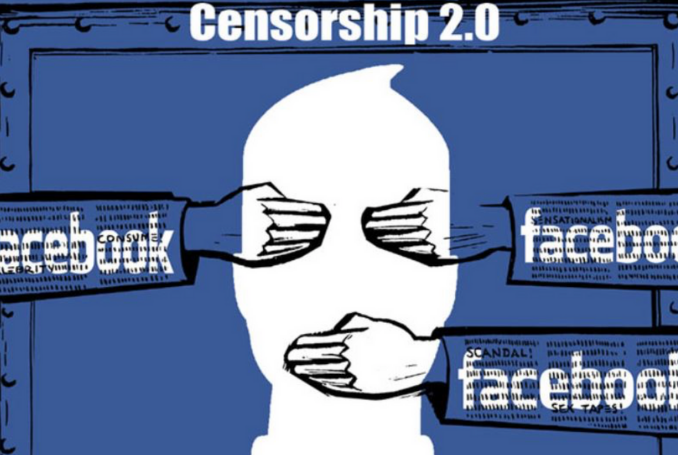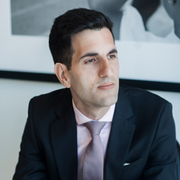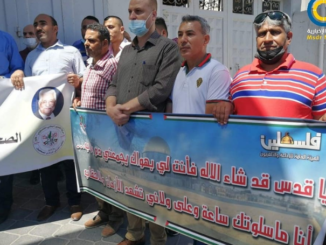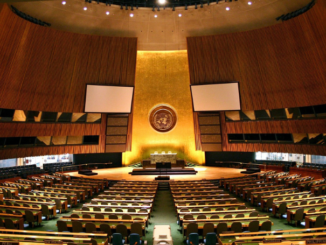
This week was my birthday. However, I spent a good part of it thinking about what deserves no celebration, namely being restricted on a Facebook page for posting Palestinian content.
The restriction has been in effect for about a month. It’s of no fault whatsoever of the page administrators or any of the Facebook users, for that matter, in charge of the page. The restriction rather was implemented by the platform itself.
Driving to my family birthday dinner, I reflected on how the restriction has affected me. It occurred to me that, to a certain degree, it has had a chilling effect. This has been manifested in the way I’ve felt less motivated to post on the page in question.
More specifically, the restriction means that when I share something on the page it is not posted, as it used to be, immediately. It rather has to be approved first by one of the administrators, something Facebook itself prevents from changing.
Often, this can take days. This has been a disincentive for me to post on the page since much of what I want to share is breaking news of crimes Israeli forces are perpetrating against the Palestinian people, and of course often with total impunity. I want to relay the news right away to both help inform and even mobilize others. Since I cannot know where the restriction exists I find other pages to do so instead.
It’s unfortunate indeed as the restriction effectively blocks me from posting important developments about Palestine, in real-time. The group also has a large audience, including over ten thousand followers worldwide. The restriction prevents me from reaching them, as fellow members of a pro-Palestinian community, without delay. Sometimes that means they will not see posts about various Palestinian demonstrations happening throughout Canada until after they are over.
All this ultimately is the result of me posting something that should never be suppressed on Facebook, if we are serious about using it constructively to amplify awareness of global injustices. The post was of a video circulating Twitter of Israeli forces violently handling a young Palestinian girl in Jerusalem. Moments later Facebook took down the post and imposed the restriction. Apparently, this goes against its posting rules, though was not given much explanation as to exactly why.
Not just myself but all Facebook users deserve such an explanation. For the video, much like the great amount of pro-Palestinian content that’s being censored by Facebook and other social media—documented recently and comprehensively by Human Rights Watch and 7maleh – The Arab Center for the Advancement of Social Media—is in the public interest. People globally are entitled to know when governments, such as Israel’s but not only theirs, horribly violate human rights and especially when it involves young people. This not only gives the opportunity to the public to respond to the violations but, while sharing video evidence of the violations themselves (e.g. the video I posted), galvanizes others to collectively hold power accountable.
By both imposing unnecessary restrictions, such as I and even The Palestine Chronicle itself has experienced, and failing to be at least adequately transparent as to why it is censoring content, such as I posted, Facebook does more than act in a simply undemocratic way (a serious issue on its own). It also impedes the flow of important information regarding Palestine. This effectively makes it an ally to Israel, which does not want the world to see what it’s doing to Palestine—on a routine basis.
If the state had it its way, it would have hidden its assassinating beloved Palestinian journalist Shireen Abu Akleh, confirmed the recent Al Jazeera documentary on Abu Akleh. Facebook acts in the same censorial spirit by limiting what pro-Palestinian voices can and cannot say on its platform. In turn, the public is also deprived of learning the full extent of Israeli criminality.
Thankfully the restriction I’ve experienced is only temporary. But imagine—and this can very well happen if we don’t, in solidarity with Palestine, push back—if the restriction were indefinite, as well as if similar unfair measures were taken by Facebook anytime a user published content that undermines the image of Israel as a “democracy.”
Though it would not on the whole weaken the growing strength of the international struggle for Palestinian justice it would, however gradually, condition pro-Palestinian voices to give up posting on Facebook. This is similar to what I’ve experienced the last month but on a global scale. Herein lies the dangerous potential for Facebook to demoralize pro-Palestinian voices while suppressing a great deal of what they would otherwise express on the platform. Recalling an excellent observation made by the editor of The Palestine Chronicle and Palestinian activist, Ramzy Baroud, namely “as far as Palestine is concerned, Facebook is now an Israeli organization through and through.”
Facebook’s own policies about how it regulates various forms of speech and expression do not go far enough in terms of ensuring that it will not unnecessarily restrict or even censor pro-Palestinian content. If anything it continues to show that it is actually averse to this content, often exposing the inhumanity and cruelty that Israel inflicts against Palestine but normally left outside mainstream news media.
Especially at a time where Western and other governments routinely fail to discuss or oppose this, voices that do the opposite are crucial. As pro-Palestinian journalists, activists or artists they are helping educate the public. Likewise, they should be commended, not punished. To publicize Israel’s mistreatment of the Palestinian people is an act of courage. For even as we enter 2023, this happens always against a societal backdrop where those who do are often smeared, lose employment, or are absurdly labeled “antisemitic.” Indeed revealing Israel for what it really is is to put oneself, to various degrees, on the line.
This is both sad and upsetting. To present Israel in an unflattering but truthful light chips away at its “legitimacy” as a morally and legally sound entity. People of conscience understood that this is good. In practical terms, it also strengthens international support for the Palestinian struggle for justice. Concealing Israeli crimes against Palestine directly (e.g. proactively censoring Palestinian content) or indirectly (e.g. discouraging Facebook users from posting such content), unnecessarily prolongs the struggle.
That means more dead Palestinians at the hands of Israel. If Facebook, if it’s to continue branding itself as “inclusive” or “progressive”, can in no way accommodate this. Instead, it must do all it can to ensure that voices protesting violence against Palestinians are protected.
Unlike Israel, they care about humanity.

– Paul Salvatori is a Toronto-based journalist, community worker and artist. Much of his work on Palestine involves public education, such as through his recently created interview series, “Palestine in Perspective” (The Dark Room Podcast), where he speaks with writers, scholars and activists. He contributed this article to The Palestine Chronicle.









